2021-2022
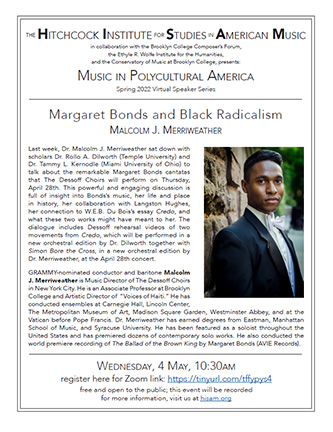
Poster for Margaret Bonds and Black Radicalism
Margaret Bonds and Black Radicalism
with Malcolm J. Merriweather
Wednesday, May 4, 2022
10:30 a.m.
Register via Zoom
Last week, Dr. Malcolm J. Merriweather sat down with scholars Dr. Rollo A. Dilworth (Temple University) and Dr. Tammy L. Kernodle (Miami University of Ohio) to talk about the remarkable Margaret Bonds cantatas that The Dessoff Choirs will perform on Thursday, April 28th. This powerful and engaging discussion is full of insight into Bonds’s music, her life and place in history, her collaboration with Langston Hughes, her connection to W.E.B. Du Bois’s essay Credo, and what these two works might have meant to her. The dialogue includes Dessoff rehearsal videos of two movements from Credo, which will be performed in a new orchestral edition by Dr. Dilworth together with Simon Bore the Cross, in a new orchestral edition by Dr. Merriweather, at the April 28th concert.
Grammy-nominated conductor and baritone Malcolm J. Merriweather is Music Director of The Dessoff Choirs in New York City. He is an Associate Professor at Brooklyn College and Artistic Director of “Voices of Haiti.” He has conducted ensembles at Carnegie Hall, Lincoln Center, The Metropolitan Museum of Art, Madison Square Garden, Westminster Abbey, and at the Vatican before Pope Francis. Dr. Merriweather has earned degrees from Eastman, Manhattan School of Music, and Syracuse University. He has been featured as a soloist throughout the United States and has premiered dozens of contemporary solo works. He also conducted the world premiere recording of The Ballad of the Brown King by Margaret Bonds (AVIE Records).
Free and open to the public; this event will be recorded.
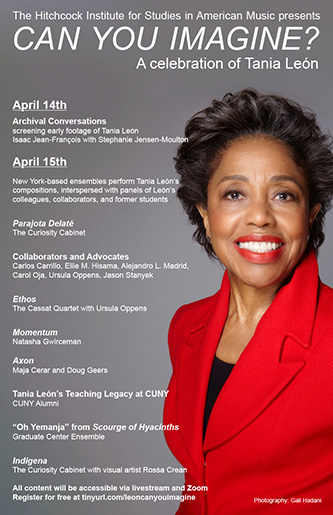
Poster for Can You Imagine? A celebration of Tania León
Can You Imagine? A celebration of Tania León
April 14, 2022, 7 p.m. EST
April 15, 2022, 10 a.m.-4 p.m. EST
Registration
All content will be accessible via livestream and Zoom.
Join friends, colleagues, and collaborators of acclaimed composer and Distinguished Professor Tania León for a springtime celebration of her Pulitzer Prize win for Stride and recent retirement from Brooklyn College and the CUNY Graduate Center.
This two-day symposium organized by the Hitchcock Institute for Studies in American Music and sponsored by the Baisley Powell Elebash Fund will kick off at 7 p.m. on Thursday evening 14 April with a screening of archival footage ranging from premiere performances of León’s collaborations with Dance Theatre of Harlem to the London Sinfonietta’s surprise gift of choreography for her piece Toque.
On Friday 15 April, performances of León’s work will be livestreamed beginning at 10 a.m. from Elebash Hall at the Graduate Center, interspersed with two distinguished panels of León’s colleagues and former students.
American Music Review, Volume LI, Issue 1, Fall 2021
- Institute News (pdf)
- “Can You Imagine?”: Reflections on the Career of Tania León (pdf)
- Biographical Counterpoint: A Conversation with Alejandro L. Madrid on Writing Tania León’s Stride: A Polyrhythmic Life (pdf)
- Tania León: Perpetuum Mobile of Inspiration (pdf)
- Archiving Tania León’s Limitless Dance (pdf)
- Considering Gestural References to Batéy in Performing Axon by Tania León (pdf)
Schedule
Thursday, April 14, 2022, 7 p.m. - Archival Conversations
Screening footage of Tania León and her work in performance
Isaac Jean-François, Yale University with Stephanie Jensen-Moulton, Brooklyn College
Friday, April 15, 2022 10 a.m.-4 p.m. - Performances and Panels
10 a.m. Parajota Delaté (1991)
Performed by the Curiosity Cabinet, conducted by Whitney George
10:15 a.m. Distinguished Collaborators and Advocates
Jeffrey Taylor and Stephanie Jensen-Moulton, Moderators, Brooklyn College
with Professor Carlos Carrillo, University of Illinois, Champaign-Urbana, Dean Ellie M. Hisama, University of Toronto, Professor Alejandro L. Madrid, Cornell University, Professor Carol Oja, Harvard University, Distinguished Professor Ursula Oppens, Brooklyn College and The Graduate Center, CUNY, and Professor Jason Stanyek, St. John’s College, Oxford University
11:30 a.m. Ethos (2014)
Cassatt Quartet with Ursula Oppens
12:30 p.m. Break
1:30 p.m.
- Momentum (1984)
Natasha Gwirceman, piano - Axon (2002)
Maja Cerar, violin, Doug Geers, electronics
2 p.m. Tania León's Teaching Legacy at CUNY
Douglas Cohen, Moderator
with Brooklyn College and Graduate Center Alumni Whitney George, Hyun-Kyung Lee, Andre Juan, Felix Jarrar, Angélica Negrón, Ivonne Paredes, Jabbath Roa, Jessica
Rudman, and Amir Spilman
3:15 p.m. “Oh Yemanja” from Scourge of Hyacinths (1994)
Graduate Center DMA Ensemble (Charlotte Mundy, soprano, Kirsten Jermé, cello, and Antonio Valentin, piano)
3:30 p.m. Indígena (1991)
Performed by the Curiosity Cabinet, conducted by Whitney George
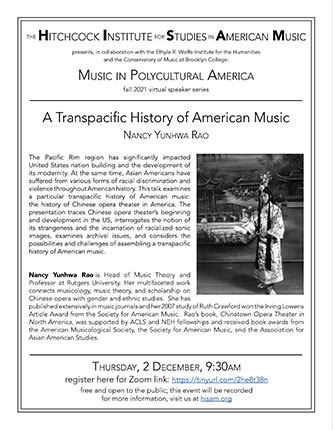
Poster for A Transpacific History of American Music
A Transpacific History of American Music
with Nancy Yunhwa Rao, Head of Music Theory and Professor, Rutgers University
Thursday, December 2, 2021
9:30 a.m.
Zoom Registration
Free and open to the public
The Pacific Rim region has significantly impacted United States nation building and the development of its modernity. At the same time, Asian Americans have suffered from various forms of racial discrimination and violence throughout American history. This talk examines a particular transpacific history of American music: the history of Chinese opera theater in America. The presentation traces Chinese opera theater's beginning and development in the US, interrogates the notion of its strangeness and the incarnation of racialized sonic images, examines archival issues, and considers the possibilities and challenges of assembling a transpacific history of American music.
Nancy Yunhwa Rao is Head of Music Theory and Professor at Rutgers University. Her multifaceted work connects musicology, music theory, and scholarship on Chinese opera with gender and ethnic studies. She has published extensively in music journals and her 2007 study of Ruth Crawford won the Irving Lowens Article Award from the Society for American Music. Rao's book, Chinatown Opera Theater in North America, was supported by ACLS and NEH fellowships and received book awards from the American Musicological Society, the Society for American Music, and the Association for Asian American Studies.
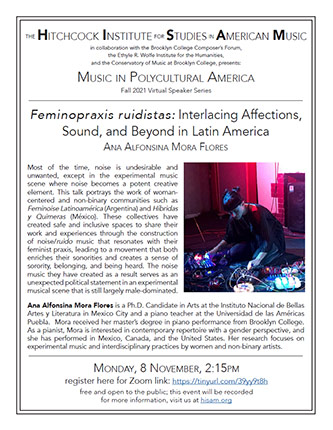
Poster for Feminopraxis ruidistas: Interlacing Affections, Sound, and Beyond in Latin America
Feminopraxis ruidistas: Interlacing Affections, Sound, and Beyond in Latin America
with Ana Alfonsina Mora Flores
Monday, November 8, 2021
2:15 p.m.
Zoom Registration
Free and open to the public
Most of the time, noise is undesirable and unwanted, except in the experimental music scene where noise becomes a potent creative element. This talk portrays the work of woman-centered and non-binary communities such as Feminoise Latinoamérica (Argentina) and Híbridas y Quimeras (México). These collectives have created safe and inclusive spaces to share their work and experiences through the construction of noise/ruido music that resonates with their feminist praxis, leading to a movement that both enriches their sonorities and creates a sense of sorority, belonging, and being heard. The noise music they have created as a result serves as an unexpected political statement in an experimental musical scene that is still largely male-dominated.
Ana Alfonsina Mora Flores is a Ph.D. Candidate in Arts at the Instituto Nacional de Bellas Artes y Literatura in Mexico City and a piano teacher at the Universidad de las Américas Puebla. Mora received her master’s degree in piano performance from Brooklyn College. As a pianist, Mora is interested in contemporary repertoire with a gender perspective, and she has performed in Mexico, Canada, and the United States. Her research focuses on experimental music and interdisciplinary practices by women and non-binary artists.
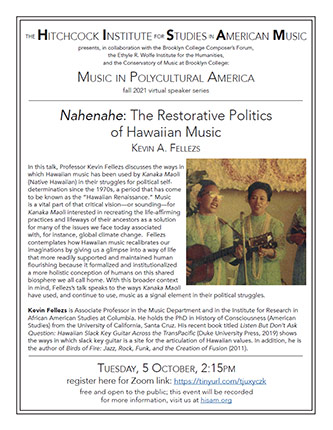
Poster for Nahenahe: The Restorative Politics of Hawaiian Music
Nahenahe: The Restorative Politics of Hawaiian Music
with Kevin A. Fellezs
Tuesday, October 5, 2021
2:15 p.m.
Zoom Registration
Free and open to the public
In this talk, Professor Kevin Fellezs discusses the ways in which Hawaiian music has been used by Kanaka Maoli (Native Hawaiian) in their struggles for political self-determination since the 1970s, a period that has come to be known as the “Hawaiian Renaissance.” Music is a vital part of that critical vision—or sounding—for Kanaka Maoli interested in recreating the life-affirming practices and lifeways of their ancestors as a solution for many of the issues we face today associated with, for instance, global climate change. Fellezs contemplates how Hawaiian music recalibrates our imaginations by giving us a glimpse into a way of life that more readily supported and maintained human flourishing because it formalized and institutionalized a more holistic conception of humans on this shared biosphere we all call home. With this broader context in mind, Fellezs’s talk speaks to the ways Kanaka Maoli have used, and continue to use, music as a signal element in their political struggles.
Kevin Fellezs is associate professor in the Music Department and in the Institute for Research in African American Studies at Columbia. He holds the Ph.D. in History of Consciousness (American Studies) from the University of California, Santa Cruz. His recent book titled Listen But Don’t Ask Question: Hawaiian Slack Key Guitar Across the TransPacific (Duke University Press, 2019) shows the ways in which slack key guitar is a site for the articulation of Hawaiian values. In addition, he is the author of Birds of Fire: Jazz, Rock, Funk, and the Creation of Fusion (2011).






